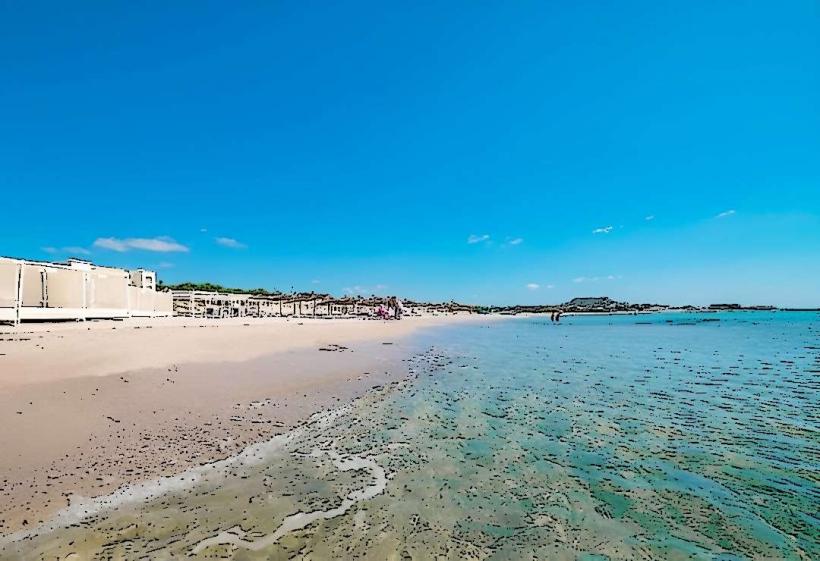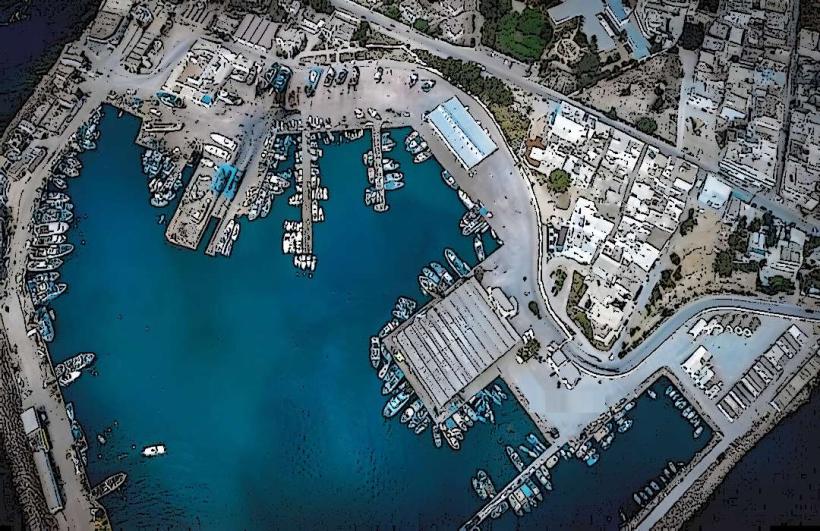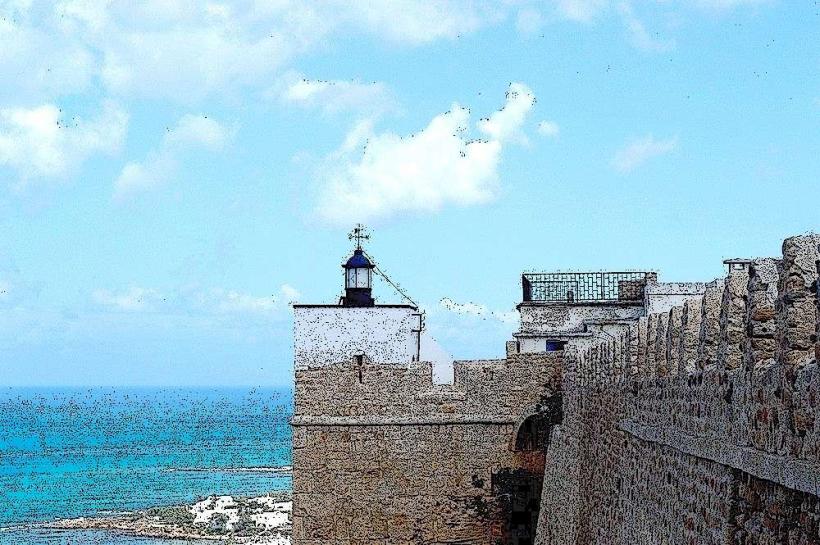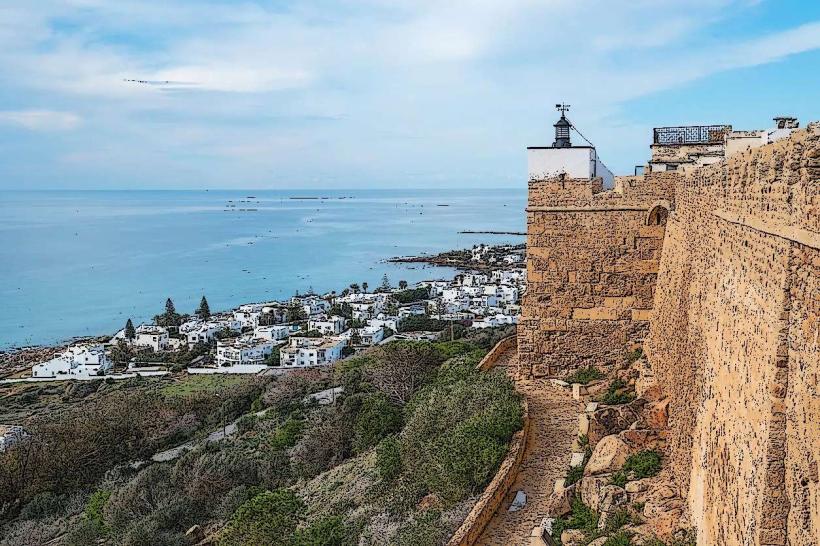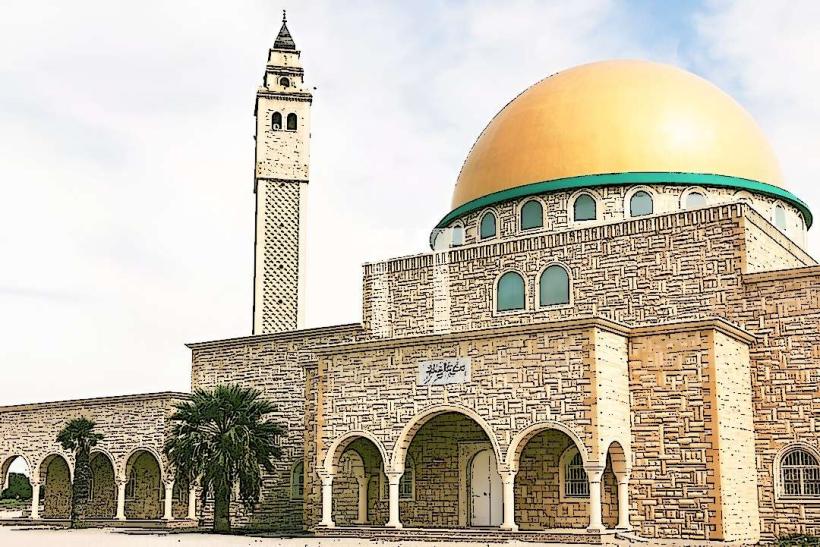Information
Landmark: Borj Kelibia (Kelibia Fort)City: Kelibia
Country: Tunisia
Continent: Africa
Borj Kelibia (Kelibia Fort), Kelibia, Tunisia, Africa
Kelibia Fort (also known as Borj Kelibia) is a prominent historic fortress perched on a rocky promontory above the Mediterranean Sea in the town of Kelibia, on Tunisia’s Cap Bon peninsula. This structure is one of the most impressive and best-preserved coastal forts in the country, offering both historical significance and breathtaking views.
Overview and Location
Coordinates: Easternmost point of Cap Bon, overlooking the Strait of Sicily
Elevation: Approximately 150 meters above sea level, directly above Plage El Mansoura
Accessibility: Easily reachable on foot or by car from central Kelibia (less than 2 km)
Historical Background
Built in the 12th century during the Hafsid dynasty, the fort was initially constructed as part of Tunisia's coastal defense system to protect against maritime invasions and piracy.
Strengthened over the centuries, particularly under Ottoman rule, as threats from European naval powers (especially the Spanish, Genoese, and later the French) increased.
It was part of a larger network of coastal fortifications along Tunisia’s Mediterranean coast, including those in Bizerte, Monastir, and Mahdia.
The fort's location made it a strategic military lookout, enabling surveillance of the sea and early warning of incoming ships from Sicily, Malta, or Southern Italy.
Architecture and Layout
Shape: Roughly rectangular, with bastions at key corners and a large central courtyard
Walls: Built of limestone blocks, thick and high, designed to withstand cannon fire
Towers and watchpoints: Still intact, offering elevated vantage points in all directions
Entrances: Fortified main gate with original wooden and iron door elements still visible
Interior features:
Soldier barracks and storerooms
Water cisterns carved into the rock
Underground chambers likely used for munitions or prison cells
A mosque or prayer room, indicating the religious role of the garrison
The architecture reflects a blend of Islamic and Ottoman military design, with functional simplicity and defensive priorities.
Panoramic Views
From the ramparts of the fort, visitors enjoy spectacular 360-degree views:
To the east: The open Mediterranean Sea and the Strait of Sicily, sometimes as far as the horizon on clear days
To the south: The town of Kelibia and the agricultural plains of Cap Bon
To the west: Vineyards, olive groves, and the faint outline of Nabeul’s coastal settlements
To the north: Plage El Mansoura, one of Tunisia’s finest beaches, directly below the cliffs
The view at sunset is particularly breathtaking, as the sun descends behind the Cap Bon hills while the sea below turns golden.
Cultural and Touristic Role
Open to the public: The fort has been partially restored and is accessible to visitors year-round
Entry fee: Very modest (usually 1–2 Tunisian dinars)
Tourist amenities: Limited; there are no guided tours on-site, but local guides in Kelibia can be arranged
Often used as a photographic site, especially by wedding and travel photographers
Sometimes hosts cultural events, including art exhibits or historical reenactments
Preservation and Challenges
The fort is in relatively good condition compared to other coastal ruins in Tunisia, thanks to ongoing maintenance and community pride
However, weathering from sea winds, erosion, and occasional lack of signage or protection for fragile structures remain concerns
Conservation efforts are supported by local heritage organizations, though funding is limited
Visiting Tips
Footwear: Wear sturdy shoes; the pathways and stairs are often uneven and rocky
Timing: Early morning or late afternoon is best to avoid heat and to enjoy the best light for photography
Bring water: There are no shops inside the fort; hydration is important, especially in summer
Combine with: A beach visit to El Mansoura, or a day trip to the nearby Kerkouane archaeological site
Significance
Kelibia Fort is not just a military relic-it is a symbol of Cap Bon’s historical identity. It stands as a testament to Tunisia’s maritime history, its resilience against foreign invasion, and the cultural depth of its regional heritage.
For visitors to the area, the fort offers a rare combination of:
Historical immersion
Architectural admiration
Natural beauty
Panoramic inspiration
It is a must-see destination for anyone exploring northern Tunisia, especially those interested in history, photography, or coastal landscapes.

